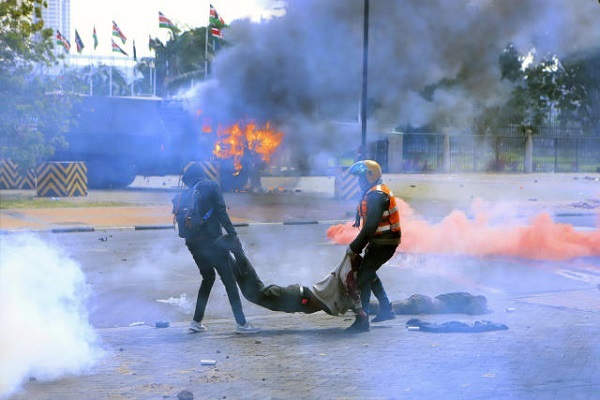Anti-tax protesters in the Kenyan capital Nairobi have pushed their way into the complex where parliament sits.
Local TV has bene showing images of a police truck on fire nearby.
There have been reports of people being wounded as police fired rounds to disperse the crowds.
A human rights organisation said it has witnessed four protesters being shot, and said that one person had been been killed. This has not been confirmed.
"Such actions are unacceptable and constitute a grave violation of human rights," the NGO the Kenya Human Rights Commission said.
Thousands of protesters have been engaged in running battles with the police since morning, with the security officers firing rubber bullets and teargas to break up the crowds.
There have been concurrent protests around the country.
The push by the protesters came just as MPs passed a controversial finance bill that introduced unpopular tax proposals.
All through the day businesses were shut and transport has been paralysed in the city as police engaging in running battles with demonstrators.
The youth-led protests have been calling on MPs to reject proposed tax increases. The government, which has rowed back on some of the most controversial measures, says new taxes are needed to fund spending programmes and lessen the debt burden.
Earlier, an AFP journalist was quoted as hearing a police officer tell his colleagues to " get the rubber bullets from the box".
The police then reportedly started firing in the air and at the protesters. Officers have been deployed to protect various key government installations including parliament.
A BBC reporter in Nairobi said the crowds, in their thousands, were much bigger than in previous protests and the police seemed to be overwhelmed.
The protesters who had been shouting "reject the finance bill" vowed to get to the parliament complex.
"We are coming to reject the taxes that are being imposed... We had been given promises that within two years we would see change, but what change are we seeing?" 24-year-old Derrick Mwathu told the BBC.
"There some things that are hard to understand, like how can you impose 16% tax on bread! How can you tax sanitary pads."
He was referring to some of the controversial measures initially proposed - the government has since said it would not impose the tax on bread and only tax imported sanitary items.
BBC





